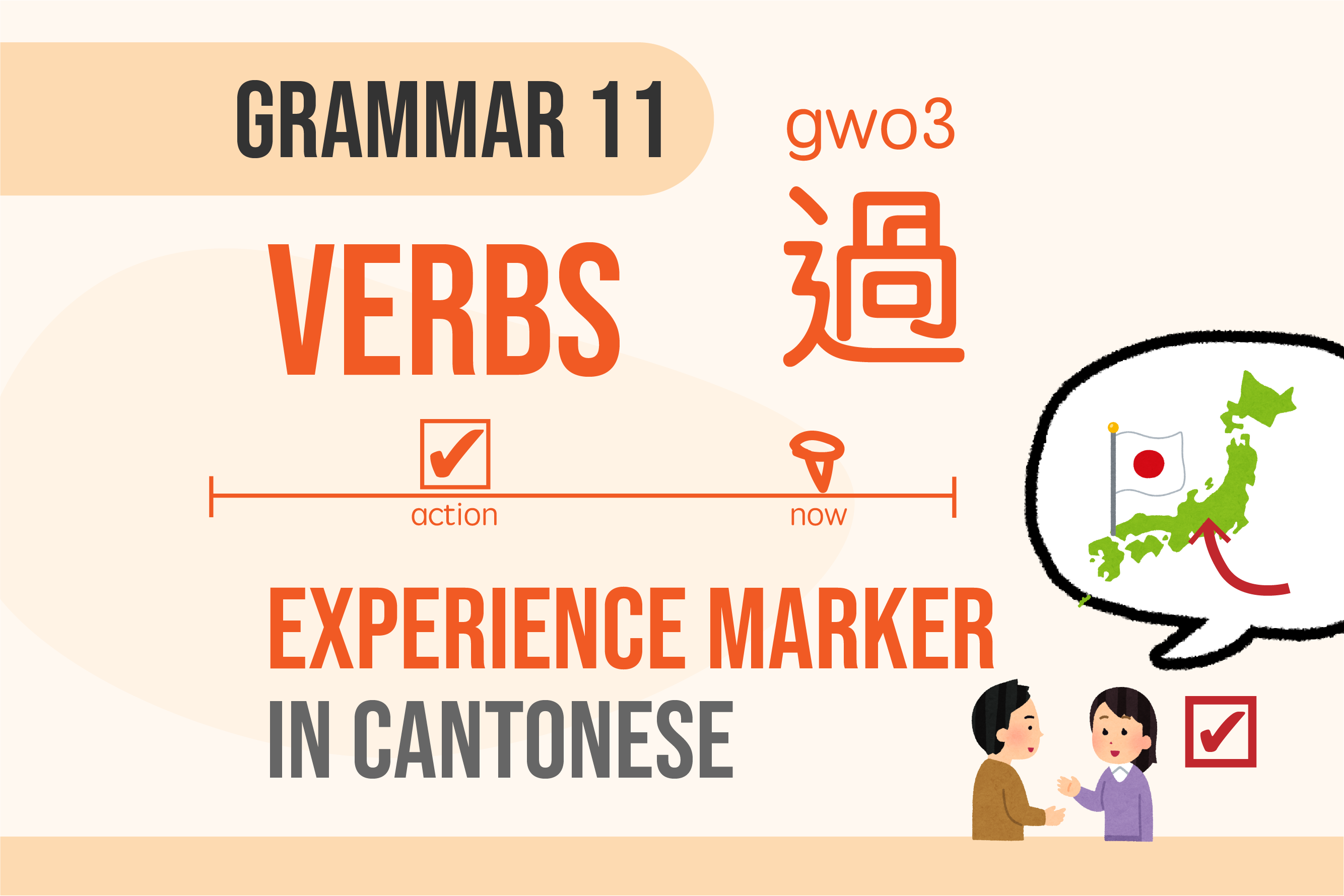As mentioned in the previous lesson, when talking about past events in Cantonese, we use different verb aspect markers depending on the context. One such marker is 過.
To talk about past experiences or whether something has ever happened (usually over a lifetime if not specified), we use the Subject-Verb-Object (SVO) structure, similar to other verb aspect markers, and add 過 after the verb. Its Mandarin equivalent is also 過.
It is placed between verb and object in the same way as 緊 for the continuous aspect. You can refer back to Grammar09 - Cantonese Verb Continuous Marker 緊(gan2) for where to place aspect markers.
This marker can express past, past perfect, past perfect continuous, and present perfect tenses in English.
Question
【Subject - 有冇 - Verb - 過 - Object ?】
The phrase 有冇 (有 - "have" | 冇 - "don't have") is used before the verb when forming a question with 過. It's a way of asking if someone has ever experienced doing a particular action, literally "(You) have or don't have the experience of ....?"
(你聽呢首歌)
(You listen to this song.)你有冇聽過呢首歌?
Have you ever heard of this song?(你愛我)
(You love me.)你有冇愛過我?
Have you ever loved me? / Did you ever love me?(你去日本)
(You go to Japan.)你有冇去過日本?
Have you ever been to Japan?
(lit. Have you ever gone to Japan?)
Transitive Verbs
(+ve)【Subject - Verb - 過 - Object 】
(-ve)【Subject - 冇 - Verb - 過 - Object 】
(我食咖喱魚蛋)
(I eat curry fish balls.)我喺香港食過咖哩魚蛋
I have had(/eaten) curry fish balls in Hong Kong.(我食煙)
(I smoke.)
(lit. I eat smoke. The word "smoke" cannot be used as verb in Cantonese.)我冇食過煙
I have never smoked.
(lit. I don't have eaten smoke. 冇 - don't have)(我哋去日本)
(We go to Japan.)我哋去過兩次日本
We have been to Japan twice.
(lit. We have gone to Japan twice.)我哋冇去過日本
We have never been to Japan.
(lit. We don't have gone to Japan twice.)
Verbs with Complementing Noun
(+ve)【Subject - [Verb - 過 - Noun]】
(-ve)【Subject - 冇 - [Verb - 過 - Noun]】
("Verb-noun phrase" functions as a single verb. See Grammar08 - Verbs for more about "Verb-Noun" phrase.
(我同佢哋食飯)
(I have meals/lunch/dinner with them.)
(lit. I eat rice with them. 食飯 is a term that generally means 'eating food' and can also refer to having meals.)我同佢哋食過兩次飯
I have had meals/lunch/dinner with them twice.
(lit. I have eaten rice with them twice.)(你跑步)
(You run.)你兩個月冇跑過步
You have not run / have not been running / had not run / had not been running for 2 months.(我瞓覺)
(I sleep.)我成晚冇瞓過覺
I have not slept all night.
Double-character Verbs
(+ve)【Subject - [Double-character Verb] - 過- Object 】
(-ve)【Subject - 冇 - [Double-character Verb] - 過- Object 】
(我解釋呢個問題)
(I explain this question.)我解釋過呢個問題好多次
I have explained this question so many times.(我喺英國生活)
(I live in the UK.)我喺英國生活過兩年
I lived in the UK for 2 years.
(It implies that I am no longer living in the UK)(你相信我)
(You trust me.)你冇相信過我
You never trusted / have never trusted / had never trusted me.
Both 咗 and 過 can be used to describe past events in Cantonese, much like how we use past, present perfect, past perfect, and past continuous tenses in English. However, there are some nuances between them depending on the context. We’ll explore these nuances in more detail in a future lesson.
